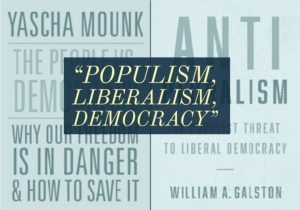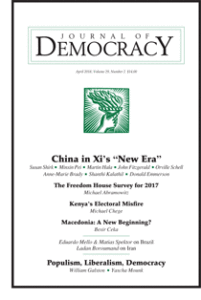Cultural divisions and resentments are driving the rise of authoritarian populism across the Western world, according to a new book. Cultural backlash: Trump, Brexit, and authoritarian populism, by Pippa Norris and Ronald Inglehart, proposes an explanation to why voters and parties alike have drifted towards authoritarian and populist attitudes and candidates, notes analyst Kenneth Bunker.
After laying out the logical sequence of steps that underpin the theory, the authors examine a wide range of data to show that cultural issues have once again become a central determinant of public opinion and voter preferences. Their “extraordinarily simple yet comprehensive” theory suggests that a shift in long-term social structures sparked a silent revolution in cultural values, he writes for Democratization:
 As the natural process of generational replacement eroded the conservative agenda, liberal concerns came to the forefront. This tipping-point triggered an authoritarian reflex in traditional segments of society; particularly those composed of older generations, white men, rural communities and the non-college educated. In the midst of declining economic conditions and growing social diversity, they turned to populist candidates willing to hold the establishment accountable for their losses.
As the natural process of generational replacement eroded the conservative agenda, liberal concerns came to the forefront. This tipping-point triggered an authoritarian reflex in traditional segments of society; particularly those composed of older generations, white men, rural communities and the non-college educated. In the midst of declining economic conditions and growing social diversity, they turned to populist candidates willing to hold the establishment accountable for their losses.
Over the past decade, a number of liberal democracies reached a critical juncture, Norris and Inglehart contend: “The interwar generation, non-college graduates, the working class, white Europeans, the more religious, men and residents of rural communities” became “estranged from the silent revolution in social and moral values, left behind by cultural tides that they deeply reject.”
On one side of the divide are those Norris and Inglehart describe in a 2016 paper as comfortable with “an inexorable cultural escalator moving postindustrial societies steadily in a more progressive direction,” Thomas B. Edsall writes for the New York Times. This new direction amounts to what the authors call
an intergenerational shift toward post-materialist values, such as cosmopolitanism and multiculturalism, generating rising support for left-libertarian parties such as the Greens and other progressive movements advocating environmental protection, human rights, and gender equality.
On the other side, Norris and Inglehart write, is a counterrevolution, a
retro backlash, especially among the older generation, white men, and less educated sectors, who sense decline and actively reject the rising tide of progressive values, resent the displacement of familiar traditional norms, and provide a pool of supporters potentially vulnerable to populist appeals.
 The debate over whether the rise of right-wing populism is driven by cultural anxiety, racism, ethnocentricity or economic deprivation may “be somewhat artificial,” Norris and Inglehart contend because
The debate over whether the rise of right-wing populism is driven by cultural anxiety, racism, ethnocentricity or economic deprivation may “be somewhat artificial,” Norris and Inglehart contend because
interactive processes may possibly link these factors, if structural changes in the work force and social trends in globalized markets heighten economic insecurity, and if this, in turn, stimulates a negative backlash among traditionalists toward cultural shifts. It may not be an either/or question, but one of relative emphasis with interactive effects.
A 2016 study of 31 European countries by Norris and Inglehart – contributors to the NED’s Journal of Democracy – found that populist voting owed more to “cultural backlash” than to “economic insecurity”.
 “On the plus-side, it is claimed that populism can be a useful corrective for liberal democracy, if it encourages innovative forms of direct participation, highlights genuine public concerns neglected or quarantined by cosmopolitan liberal elites, and brings the cynical back into politics, “the authors suggest:
“On the plus-side, it is claimed that populism can be a useful corrective for liberal democracy, if it encourages innovative forms of direct participation, highlights genuine public concerns neglected or quarantined by cosmopolitan liberal elites, and brings the cynical back into politics, “the authors suggest:
Democracies have many flaws and reform movements can help to reduce corruption, strengthen participation, and deepen democracy. Populist parties claim to speak for forgotten segments of society and they may potentially mobilize disaffected non-voters and under-represented groups to participate, thereby expanding campaign activism and turnout.
“But on the negative side, many sound the alarm about the potential threat that the rise of authoritarian populism poses to longstanding norms and institutions of liberal democracy, where populist discourse denigrates ‘fake’ media, dishonest politicians and corrodes respect for free speech, social tolerance, and confidence in government.”
The combination of authoritarianism and populism is especially damaging to liberal democracy.
“The danger is that populism undermines public confidence in the legitimacy of liberal democracy while authoritarianism actively corrodes its principles and practices,” Norris and Inglehart conclude.







